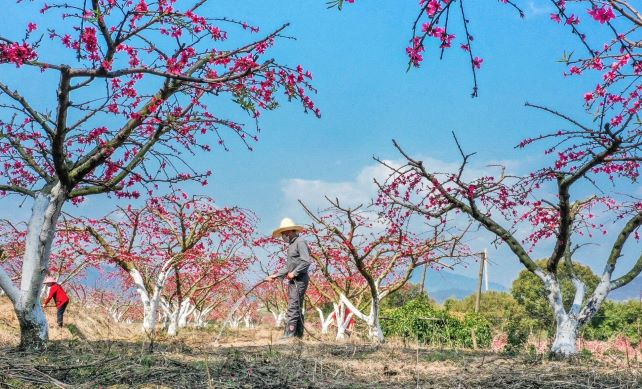Eco-friendly peach orchards E China’s Jiangsu province become money-spinner
By Shen Lin, People’s Daily
Photo taken on Feb. 26 shows farmers watering and weeding a peach orchard in a poverty-relief base in Dayu county of east China’s Jiangxi province. (Photo by Wu Shousheng/People’s Daily Online)
“Our net income reached 300,000 yuan (about $42,394) last year. These honey peach trees and autumn peach trees are ‘money trees’ to us,” said orchardist Xue Jiacong while bagging fruit on peach trees in early summer.
Xue, who lives in Siyang county of east China’s Jiangsu province, is one of the farmers in Siyang county who have become rich by running eco-friendly peach orchards.
In recent years, Siyang county has made great efforts to tap into its well-established reputation as the “hometown of peaches” and blazed a trail of green development for peach industry.
With a total of 60,000 mu (4,000 hectares) of famous, special, and high-quality varieties of peach trees, Siyang county saw its overall production value of peach industry reached one billion yuan last year.
The industry has provided jobs for more than 12,000 local people, increasing income of local farmers by nearly 100 million yuan.
The eco-friendly planting methods adopted by local orchardists are the key to Siyang’s success in making peach trees money-spinners of the local people.
“Our peaches have never been sold at less than 20 yuan per kilogram,” said Hua Songqing, head of a peach production cooperative in Nanliuji town, Siyang county.
“Check this drip irrigation system. It delivers diluted biogas slurry directly from pig farm to the roots of peach trees drop by drop. We use organic fertilizer and biopesticide. All the weeds are cut into small pieces with grass chopper, and then ploughed into the fields to be used as green manure,” Hua explained.
Peach association of Siyang county has promoted new peach tree planting techniques including wide-row planting and pruning the longer branches off the trees, according to Geng Xiaoyun, deputy secretary of Communist Party of China (CPC) Siyang county committee.
With the help of the fruit tree research center of Jiangsu Academy of Agricultural Sciences, Siyang county has built 20 standard peach orchards and five standard peach tree planting bases, with more than 90 percent of these orchards and bases adopting eco-friendly planting methods, Geng disclosed.
In an effort to win favor with consumers, all of the peach production cooperatives in Siyang county have joined Jiangsu province’s traceability platform for safety and quality of agricultural products.
When peaches come on the market, consumers can get information about the whole growing process of the peaches by simply scanning the QR code on the fruit with a mobile phone, said Wei Guo, deputy head of Siyang county.
“The QR code on each peach brings higher selling prices to the fruit, which has motivated more orchardists to adopt eco-friendly planting methods,” Wei added.
Eco-friendly peach tree planting methods have yielded fruitful results in Siyang county, where 33 peach production bases have obtained the accreditation for healthy food.
Peaches produced in Siyang county have been identified as agricultural products with geographical indications by China’s Ministry of Agriculture and Rural Affairs, and have won 15 gold awards and 28 silver awards at national and provincial peach contests.
Besides selling peach, Siyang county has also made its peach orchards become tourist attractions.
During this year’s International Children’s Day, many tourists brought their children to Siyang county’s Chengzi Lake resort, enjoying the view of peaches on the trees and taking pictures in the peach park of the resort.
Based on its blooming peach industry, Siyang county integrated tourism into agriculture, and established agricultural tourism bases such as the peach park in Luji town, Tao Hua Yuan Ji peach production cooperative in Nanliuji town, and the pear orchard in Aiyuan town, where the ancient pear trees were reportedly planted in the Qing Dynasty (1636-1912).
By developing programs featuring farming experience as well as holding festivals and events including peach blossom festival, peach contest, and peach picking festival, Siyang county attracts more than 100,000 person-times of tourists every year and enjoys more than 100 million yuan in annual tourism revenue.
In Siyang county, peach blossoms are not only money-making scenery, but can also be made into tea.
“The plucked flower buds and fallen peach blossoms used to be tossed away for nothing, while now they are made into peach blossom tea and sold for 2,000 yuan per kilogram,” said Zhang Jianzheng, head of a peach production cooperative in Zhuangtan village, Nanliuji town, disclosing that the cooperative sold its baked peach blossoms for 30,000 yuan this year.
To bring into full play of its peach orchards, Siyang county knows clearly that deep processed peach products are just as important as fresh peach.
“A case with six bottles of canned peach can be sold for 90 yuan online. The prices of peach can rise by four to five times after it is made into canned fruit,” remarked Liu Zhengjun, an orchardist in Aiyuan village, who benefited from deep processing.
So far, Siyang county has developed mature systems for deep processed peach products, including peach blossom tea, peach blossom liquor, peach blossom honey, and peach gum. The output value of these products was 560 million yuan last year.
In addition, the peach pit carving art of Yundu village, Linhe town, Siyang county, was included on UNESCO World Intangible Cultural Heritage List.
With efforts to boost innovation, extend industrial chain, and enhance value chain, Siyang has managed to organically integrate its primary industry with the secondary and tertiary industries, and is bound to enjoy a sweeter future with its peach industry.













